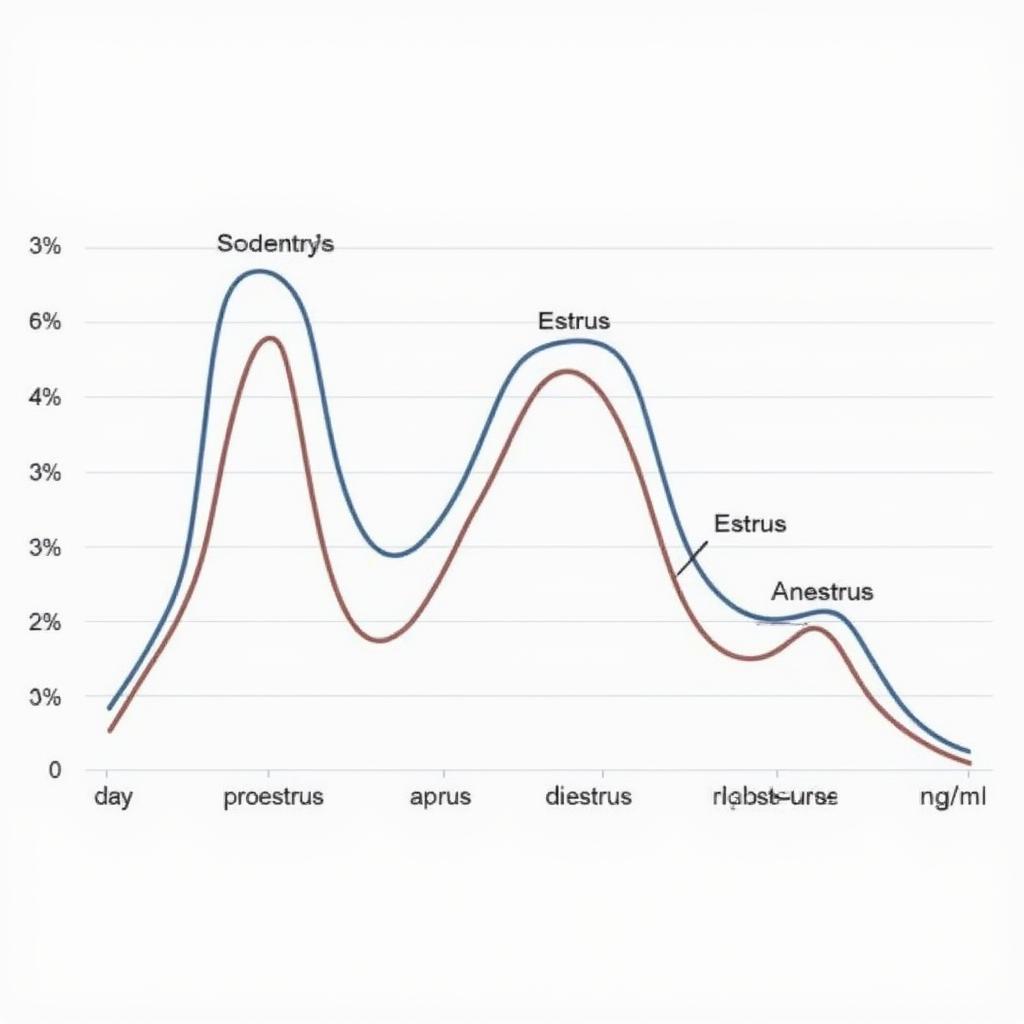Understanding the reproductive cycle of your female dog is crucial for successful breeding or for preventing unwanted pregnancies. Progesterone testing plays a vital role in determining the optimal time for breeding and monitoring pregnancy. This guide provides comprehensive information on progesterone testing in dogs, helping you find reliable testing options near you.
Why is Progesterone Testing Important for My Dog?
Progesterone is a hormone produced by the ovaries that plays a crucial role in the canine estrous (heat) cycle and pregnancy. Monitoring progesterone levels helps pinpoint ovulation, the optimal breeding time, predict litter size, diagnose pregnancy complications, and even determine the best time for a scheduled cesarean section. Knowing the precise timing of ovulation significantly increases the chances of successful fertilization and a healthy litter.
Understanding the Canine Estrous Cycle and the Role of Progesterone
The canine estrous cycle is divided into four stages: proestrus, estrus, diestrus, and anestrus. Progesterone levels fluctuate throughout these stages. During proestrus, progesterone levels are low. As the dog approaches ovulation, which occurs during estrus, progesterone levels begin to rise. Progesterone testing allows veterinarians to pinpoint the surge in progesterone, indicating the optimal time for breeding. After ovulation, during diestrus, progesterone remains elevated, whether or not the dog is pregnant. If pregnancy occurs, high progesterone levels are maintained throughout gestation.
Where Can I Find Progesterone Testing for Dogs Near Me?
Finding a qualified veterinarian to perform progesterone testing is essential. Several options are available:
- Your Primary Care Veterinarian: Most veterinary clinics offer progesterone testing. Contact your veterinarian to inquire about their services and scheduling.
- Veterinary Specialists: Reproductive specialists or theriogenologists possess in-depth knowledge of canine reproduction and can provide expert guidance.
- Veterinary Emergency Clinics: Some emergency clinics offer progesterone testing, particularly for urgent situations like diagnosing pregnancy complications.
- Online Veterinary Services: While not directly providing testing, online veterinary services can connect you with local professionals who offer progesterone testing and interpret the results.
Different Types of Progesterone Tests for Dogs
There are two main types of progesterone tests available for dogs:
- Quantitative Progesterone Testing: This test measures the exact amount of progesterone in the blood serum and is considered the gold standard for accurate results. It helps pinpoint the precise timing of ovulation.
- Qualitative Progesterone Testing: This test provides a less precise measurement, indicating whether progesterone is present above or below a certain threshold. It can be used for initial screening or in situations where precise quantification is not required.
Interpreting Progesterone Test Results in Dogs
Interpreting progesterone results requires veterinary expertise. Different progesterone levels indicate different stages of the estrous cycle:
- Low Progesterone: Indicates the early stages of proestrus or anestrus.
- Rising Progesterone: Suggests approaching ovulation. Serial testing is recommended to track the rise and pinpoint the optimal breeding time.
- High Progesterone: Indicates ovulation has occurred. Sustained high levels may suggest pregnancy.
 Chart showing canine progesterone levels during estrous cycle
Chart showing canine progesterone levels during estrous cycle
What if My Dog’s Progesterone Levels Are Abnormal?
Abnormal progesterone levels may indicate underlying reproductive issues, such as:
- Ovarian cysts: Can disrupt normal hormone production.
- Hormonal imbalances: Can affect fertility and the estrous cycle.
- Pregnancy complications: May signal problems with fetal development or placental function.
Dr. Emily Carter, DVM, DACVR, a board-certified veterinary reproductive specialist at Animal Reproduction Center of Chicago, emphasizes, ” Progesterone testing is an invaluable tool in canine reproductive management. It empowers breeders and pet owners to make informed decisions about breeding, pregnancy monitoring, and overall reproductive health.“
Progesterone Testing Costs and What to Expect
The cost of progesterone testing varies depending on the location, type of test, and veterinary clinic. Generally, quantitative tests are more expensive than qualitative tests. Discuss the cost with your veterinarian beforehand. During the testing process, a small blood sample will be collected from your dog. Results are usually available within a day or two.
Conclusion
Progesterone testing in dogs is a powerful tool for responsible breeding and pet ownership. Locating a “progesterone testing for dogs near me” ensures timely and accurate results for informed decision-making regarding your dog’s reproductive health. By understanding the role of progesterone and utilizing available testing resources, you can optimize breeding success, manage pregnancy effectively, and ensure the well-being of your canine companion. Consult with your veterinarian to discuss progesterone testing and develop a tailored reproductive health plan for your dog.
Dr. Amelia Rodriguez, a leading veterinarian with over 20 years of experience in canine reproductive health at West Coast Veterinary Center, advises, “Don’t hesitate to ask your veterinarian any questions you have about progesterone testing. They can guide you through the process and help you understand the results in the context of your dog’s individual needs.“
FAQ
-
How often should I test my dog’s progesterone levels? The frequency of testing depends on the individual dog and the reason for testing. Your veterinarian will recommend a testing schedule based on your dog’s specific needs.
-
Is progesterone testing painful for dogs? The process is similar to a routine blood draw and is generally well-tolerated by dogs.
-
Can I perform progesterone testing at home? At-home progesterone tests for dogs are not readily available or reliable. Professional veterinary testing is recommended for accurate results.
-
What factors can affect progesterone levels in dogs? Certain medications, stress, and underlying health conditions can potentially influence progesterone levels.
-
Are there any risks associated with progesterone testing in dogs? The risks associated with blood collection are minimal, including slight bruising or bleeding at the puncture site.
-
How soon can I get the results of a progesterone test? Results are typically available within 24-48 hours.
-
What is the difference between serum and plasma progesterone testing? While both tests measure progesterone, serum is the preferred sample type for accurate results in dogs.
